 What a strange and heady concoction Beastars is. My respect for both the writing (which was already high, but based mostly on reputation) and the adapting goes up with each passing episode. It’s a story that clearly has something to say – even if there are times I struggle understanding just what that is – and it’s being handled with great care and panache by Orange. My oft-quoted Midousuji Akira line fits the bill here – this is not a mass-produced model.
What a strange and heady concoction Beastars is. My respect for both the writing (which was already high, but based mostly on reputation) and the adapting goes up with each passing episode. It’s a story that clearly has something to say – even if there are times I struggle understanding just what that is – and it’s being handled with great care and panache by Orange. My oft-quoted Midousuji Akira line fits the bill here – this is not a mass-produced model.
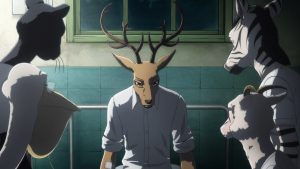 As with so much about Beastars, what happened this week virtually demanded to be seen on multiple levels. While this series is telling a story about characters that happen to be furries, it’s obviously not literally expecting us to buy into the idea of these animals living these lives any more than Shirokuma Cafe was. Yet as that series did in a far more gentle and genteel manner, Beastars wants us to take something away from this fantasy world and apply it to our own. Sometimes it’s easier to use the cover of fantasy to comment on reality, especially where hot-button issues like racism and gender politics are concerned.
As with so much about Beastars, what happened this week virtually demanded to be seen on multiple levels. While this series is telling a story about characters that happen to be furries, it’s obviously not literally expecting us to buy into the idea of these animals living these lives any more than Shirokuma Cafe was. Yet as that series did in a far more gentle and genteel manner, Beastars wants us to take something away from this fantasy world and apply it to our own. Sometimes it’s easier to use the cover of fantasy to comment on reality, especially where hot-button issues like racism and gender politics are concerned.
But then – sometimes a cigar is just a cigar.
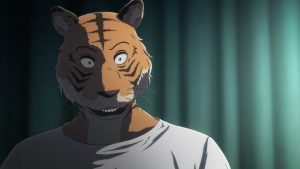 At the center of the action this week is Bill (Torashima Takaaki), a tiger who’s been literally and figuratively a bit player up to this point. As Louis wakes up in the hospital with a stress fracture in his leg, it’s Bill who lays out the logistical reality of the upcoming performance for him. And Louis signs off on Bill taking the role of Adler, something the big cat has clearly been wanting to do for a long time. That frees up Bill’s minor adversary role for someone who might fit the costume (yes, theatre troupes do get that desperate occasionally) – and that someone is Legosi.
At the center of the action this week is Bill (Torashima Takaaki), a tiger who’s been literally and figuratively a bit player up to this point. As Louis wakes up in the hospital with a stress fracture in his leg, it’s Bill who lays out the logistical reality of the upcoming performance for him. And Louis signs off on Bill taking the role of Adler, something the big cat has clearly been wanting to do for a long time. That frees up Bill’s minor adversary role for someone who might fit the costume (yes, theatre troupes do get that desperate occasionally) – and that someone is Legosi.
 The idea of Bill and Legosi as a carnivores Yin and Yang is easy to overstate, but that’s how they’re quite openly presented in this episode. Whereas Legosi shrinks from the spotlight (he’d much rather aim it) and is terrified even at the thought of a few lines on stage, Bill lusts after it. Everything Legosi hates about himself, Bill embraces. What’s implicit in his words is quite clear – he believes stardom and acclaim is his by birthright. It’s only proper that carnivores should live proudly and dominate, not like Legosi who hides in the shadows and frets over his own strength.
The idea of Bill and Legosi as a carnivores Yin and Yang is easy to overstate, but that’s how they’re quite openly presented in this episode. Whereas Legosi shrinks from the spotlight (he’d much rather aim it) and is terrified even at the thought of a few lines on stage, Bill lusts after it. Everything Legosi hates about himself, Bill embraces. What’s implicit in his words is quite clear – he believes stardom and acclaim is his by birthright. It’s only proper that carnivores should live proudly and dominate, not like Legosi who hides in the shadows and frets over his own strength.
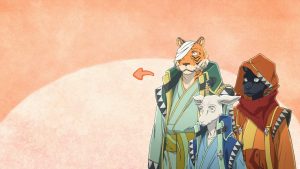 Here’s where things get interesting for me. If, as one almost inevitably has to, one takes the social structure of Cherryton as social satire, what Bill says is quite troubling. Because lets be honest here – don’t all creatures have a right to be true to themselves? Carnivores don’t naturally live the way Cherryton carnivores do. They eat real meat, they hunt, they experience the thrill of the chase and the glory of the kill. The sacrifice they make here is greater than the herbivores, because the life they lead is contrary to their biological nature. So is what Bill says really so wrong – even if Louis (an herbivore) says it is?
Here’s where things get interesting for me. If, as one almost inevitably has to, one takes the social structure of Cherryton as social satire, what Bill says is quite troubling. Because lets be honest here – don’t all creatures have a right to be true to themselves? Carnivores don’t naturally live the way Cherryton carnivores do. They eat real meat, they hunt, they experience the thrill of the chase and the glory of the kill. The sacrifice they make here is greater than the herbivores, because the life they lead is contrary to their biological nature. So is what Bill says really so wrong – even if Louis (an herbivore) says it is?
 This gets messy when one thinks about it too hard, believe me I get that. Where does the literal end and the symbolic begin with this series? It’s not an unimportant question, because there are implications in the symbolic take on this story. On a purely emotional level of course Bill is a massive tool, egomaniacal and racist, and Legosi is a decent and humble young man who wants to try and do the right thing (if he can just figure out what that is). We like Legosi and we dislike Bill, because that’s the reasonable interpretation of their characters. But the more one thinks about the dichotomy they represent, the less simple it is to sort out the right and wrong.
This gets messy when one thinks about it too hard, believe me I get that. Where does the literal end and the symbolic begin with this series? It’s not an unimportant question, because there are implications in the symbolic take on this story. On a purely emotional level of course Bill is a massive tool, egomaniacal and racist, and Legosi is a decent and humble young man who wants to try and do the right thing (if he can just figure out what that is). We like Legosi and we dislike Bill, because that’s the reasonable interpretation of their characters. But the more one thinks about the dichotomy they represent, the less simple it is to sort out the right and wrong.
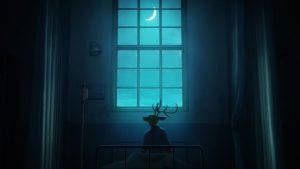 All this works so much better as drama, of course, because of the exquisite care Orange and Matsumi Shinichi are putting into this production. The level of detail is singularly impressive – like the way Legosi slouches when he walks just like a teenaged boy with self-esteem issues, or the quintessentially human way he arches an eyebrow at Bill when he senses something isn’t right. Nothing is too small to matter here – Beastars is very much a mood piece, and the staff clearly understand that the small stuff really matters when setting the mood. This show is something special, make no mistake about it – never easy, but definitely special.
All this works so much better as drama, of course, because of the exquisite care Orange and Matsumi Shinichi are putting into this production. The level of detail is singularly impressive – like the way Legosi slouches when he walks just like a teenaged boy with self-esteem issues, or the quintessentially human way he arches an eyebrow at Bill when he senses something isn’t right. Nothing is too small to matter here – Beastars is very much a mood piece, and the staff clearly understand that the small stuff really matters when setting the mood. This show is something special, make no mistake about it – never easy, but definitely special.


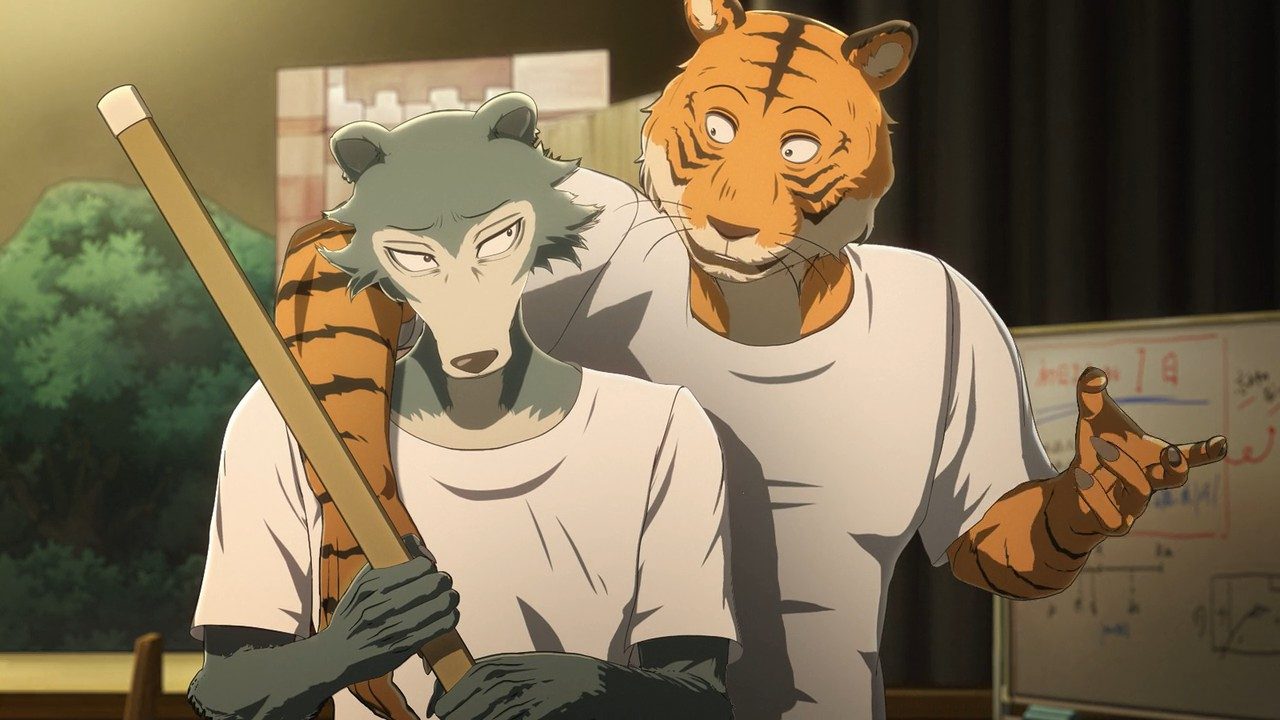


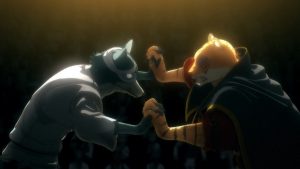
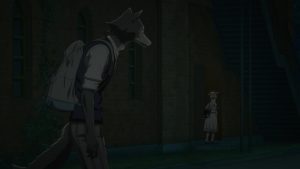
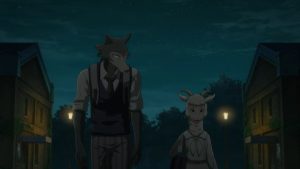

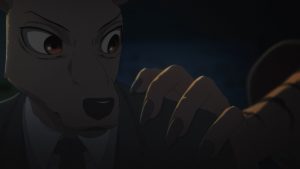

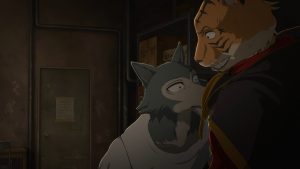
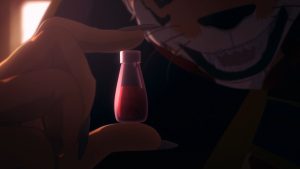
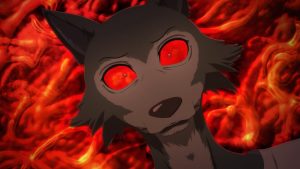

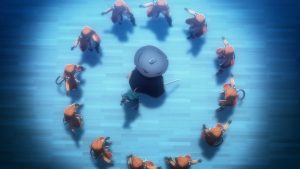
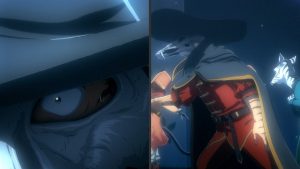
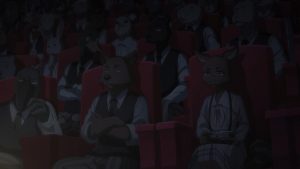
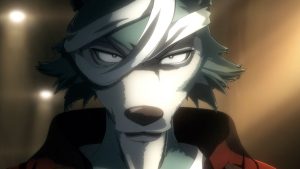
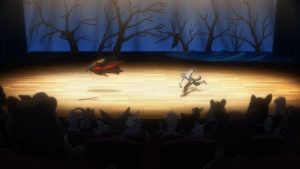
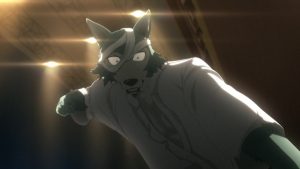
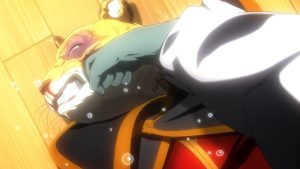
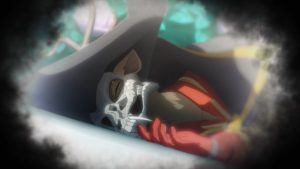

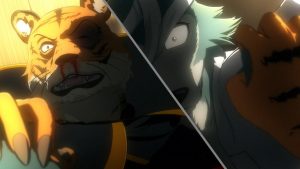
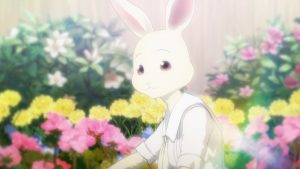
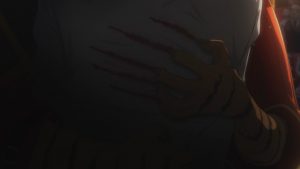


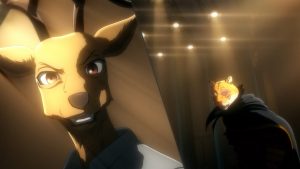

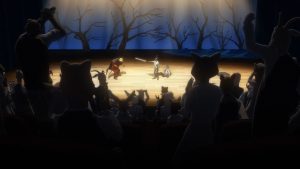

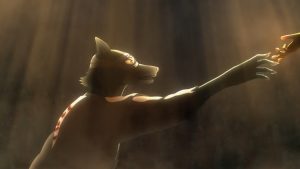
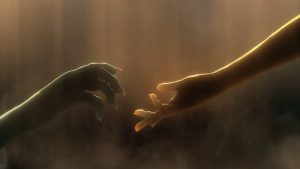
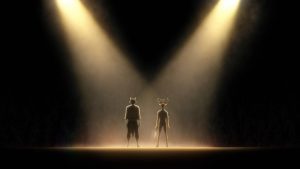


Mercesoul
November 1, 2019 at 5:05 amI didn’t quite understand why Legosi got so mad over the rabbit blood, though? Was he disgusted by the fact that Bill had it or did Legosi resist the urge to want it as well? I was confused on that part. Nevertheless, fantastic episode.
Guardian Enzo
November 1, 2019 at 7:55 amHit too close to home, IMO. An uncomfortable reminder to Legosi of all the parts of himself he feels he needs to suppress.
Plus, he’s in love with Haru…
A.Sade
November 1, 2019 at 12:37 pmProbably both, which is why he reacted so strongly.
Beastars Fan
November 1, 2019 at 7:17 pmWhat do you think of Legosi? I like him a lot desu.
Guardian Enzo
November 1, 2019 at 7:32 pmAn interesting character to be sure. I like him but I’m interesting to see where the mangaka is planning to take his development.
Nadavu
November 4, 2019 at 11:43 pmoh boy oh boy oh boy…
I expressed some concern on the season check-in about the potential disaster this series might be. This episode has put it to rest. It just keeps getting weirder, more complex, more layered and more interesting. There are definite pitfalls ahead, but I trust that whoever is stirring this boat, being smart enough to get us here, is smart enough to kno what not to do.